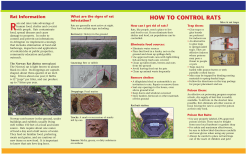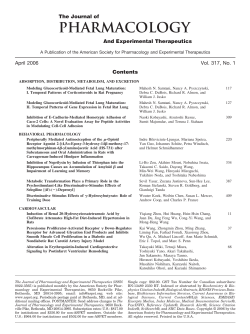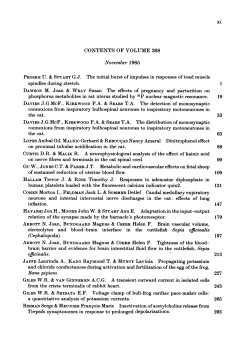
Datasheet: MCA341R Product Details
Datasheet: MCA341R Description: MOUSE ANTI RAT CD68 Specificity: CD68 Other names: ED1, MACROSIALIN Format: Purified Product Type: Monoclonal Antibody Clone: ED1 Isotype: IgG1 Quantity: 0.25 mg Product Details Applications This product has been reported to work in the following applications. This information is derived from testing within our laboratories, peer-reviewed publications or personal communications from the originators. Please refer to references indicated for further information. For general protocol recommendations, please visit www.abdserotec.com/protocols. No Not Determined Suggested Dilution Flow Cytometry(1) 1/50 - 1/100 Immunohistology - Frozen Immunohistology - Paraffin(2) 1/100 ELISA Yes Immunoprecipitation Western Blotting Immunofluorescence Radioimmunoassays Where this product has not been tested for use in a particular technique this does not necessarily exclude its use in such procedures. Suggested working dilutions are given as a guide only. It is recommended that the user titrates the product for use in their own system using appropriate negative/positive controls. (1) Membrane permeabilisation is required for this application. Serotec recommends the use of Leucoperm™ (Product Code BUF09) for this purpose. (2) This product requires protein digestion pre-treatment of paraffin sections e.g. trypsin or pronase Target Species Rat Species Cross Reactivity Reacts with: Bovine Product Form Purified IgG - liquid Preparation Purified IgG prepared by affinity chromatography on Protein A from tissue culture supernatant. Buffer Solution Phosphate buffered saline. Preservative 0.09% sodium azide. N.B. Antibody reactivity and working conditions may vary between species. Page 1 of 4 Stabilisers Approx. Protein Concentrations IgG concentration 1.0 mg/ml Immunogen Rat spleen cells External Database Links UniProt: Q4FZY1 Related reagents Fusion Partners Spleen cells from immunised BALB/c mice were fused with cells of the SP2/0-Ag14 mouse myeloma cell line. Specificity Mouse anti rat CD68, clone ED1 recognizes the rat ED1 antigen, a heavily glycosylated protein of 90-110 KDa, also known as rat CD68 (Dijkstra et al. 1985). The ED1 antigen is expressed on most macrophages populations, as well as on monocytes and is considered as a pan-macrophage marker in the rat (Damoiseaux et al. 1994). ED1 is expressed predominantly on the lysosomal membrane and lightly on the cell surface (Dijkstra et al. 1985). The expression of ED1 antigen being predominantly cytoplasmic (Dijkstra et al. 1985), flow cytometry results are improved by the use of a membrane permeabilization procedure, such as Leucoperm, prior to staining. Flow Cytometry Use 10ul of the suggested working dilution to label 1x106 cells in 100ul. References 1. Damoiseaux, J.G. et al. (1994) Rat macrophage lysosomal membrane antigen recognised by monoclonal antibody ED1. Immunol. 83: 140-147. 2. Dijkstra, C.D. et al. (1985) The heterogeneity of mononuclear phagocytes in lymphoid organs: distinct macrophage subpopulations in the rat recognised by monoclonal antibodies ED1, ED2 and ED3. Immunol 54: 589-599. 3. Bauer, J. et al. (1994) Phagocytic activity of macrophages and microglial cells during the course of Acute and Chronic Relapsing Experimental Autoimmune Encephalomyelitis. J . Neurosci. Res. 38: 365-375. 4. Bao, F. et al. (2004) Early anti-inflammatory treatment reduces lipid peroxidation and protein nitration after spinal cord injury in rats. J, Neuro-chem. 88:1335-1344. 5. Zilka, N. et al. (2009) Human misfolded truncated tau protein promotes activation of microglia and leukocyte infiltration in the transgenic rat model of tauopathy. J. Neuroimmunol. 209: 16-25. 6. Fujita, E. et al. (2010) Statin Attenuates Experimental Anti-Glomerular Basement Membrane Glomerulonephritis Together with the Augmentation of Alternatively Activated Macrophages. Am J Pathol. Aug 9. [Epub ahead of print] 7. Salegio, E.A. et al. (2011) Macrophage presence is essential for the regeneration of ascending afferent fibres following a conditioning sciatic nerve lesion in adult rats. B.M.C. Neurosci. 12:11. [Epub]. 8. Wei, X. et al. (2014) Dural fibroblasts play a potential role in headache pathophysiology. Pain. 155: 1238-44. 9. Naito, Y. et al. (2011) Dietary iron restriction prevents hypertensive cardiovascular remodeling in dahl salt-sensitive rats. Hypertension. 57: 497-504. 10. Baker, S.C. et al. (2011) Cellular Integration and Vascularisation Promoted by a Resorbable, Page 2 of 4 ParticulateLeached, CrossLinked Poly(εcaprolactone) Scaffold. Macromol Biosci. doi: 10.1002/mabi.201000415. 11. Bedi, A. et al. (2010) Effect of early and delayed mechanical loading on tendon-to-bone healing after anterior cruciate ligament reconstruction. J Bone Joint Surg Am. 92: 2387-401. 12. Liew, H.K. et al. (2012) Systemic administration of urocortin after intracerebral hemorrhage reduces neurological deficits and neuroinflammation in rats. J Neuroinflammation. 9: 13. 13. Chiu, T.L. et al. (2012) The treatment of glioblastoma multiforme through activation of microglia and TRAIL induced by rAAV2-mediated IL-12 in a syngeneic rat model. J Biomed Sci. 19: 45. 14. Glorie, L.L. et al. (2012) DPP4 inhibition improves functional outcome after renal ischemiareperfusion injury. Am J Physiol Renal Physiol. 303: F681-8. 15. Quan, L.D. et al. (2010) Development of a macromolecular prodrug for the treatment of inflammatory arthritis: mechanisms involved in arthrotropism and sustained therapeutic efficacy. Arthritis Res Ther.12: R170. 16. Peng, J.H. et al. (2012) Effects of Puerariae Radix Extract on Endotoxin Receptors and TNFα Expression Induced by GutDerived Endotoxin in Chronic Alcoholic Liver Injury. Evid Based Complement Alternat Med. 2012: 234987. 17. Matsuda, K. et al. (2010) Hemophagocytic histiocytic sarcoma in a Japanese black cow. Vet Pathol. 47: 339-42. 18. Tian, Y-F. et al. (2013) Lipoic acid suppresses portal endotoxemia-induced steatohepatitis and pancreatic inflammation in rats World J Gastroenterol. 19: 2761-71 19. Xiang, Y. et al. (2013) L-Carnitine Protects Against Cyclosporine-Induced Pancreatic and Renal Injury in Rats Transplantation Proceedings. 45: 3127-34, 20. Wang-Rosenke, Y. et al. (2013) Tyrosine kinases inhibition by Imatinib slows progression in chronic anti-thy1 glomerulosclerosis of the rat BMC Nephrology 14: 223 21. Dort, J. et al. (2013) Beneficial Effects of Cod Protein on Inflammatory Cell Accumulation in Rat Skeletal Muscle after Injury Are Driven by Its High Levels of Arginine, Glycine, Taurine and Lysine. PLoS One. 8: e77274. 22. Chang, C. et al. (2013) Docosahexaenoic acid reduces cellular inflammatory response following permanent focal cerebral ischemia in rats The Journal of Nutritional Biochemistry Aug 5. [Epub ahead of Print] 23. Machelska, H. et al. (2013) Selectins and integrins but not platelet–endothelial cell adhesion molecule-1 regulate opioid inhibition of inflammatory pain British Journal of Pharmacology 142:772-780 24. Sakuraya, K. et al. (2013) The synergistic effect of mizoribine and a direct renin inhibitor, aliskiren, on unilateral ureteral obstruction-induced renal fibrosis in rats The Journal of Urology. Oct 17 [Epub ahead of Print] 25. Xu, X et al. (2013) Aging aggravates long-term renal ischemia-reperfusion injury in a rat model Journal of Surgical Research Oct 10 [E pub ahead of print] 26. Kim, Y. et al. (2013) Enhancement of bone regeneration by dual release of a macrophage recruitment agent and platelet-rich plasma from gelatin hydrogels. Biomaterials. Oct 11. [Epub ahead of print] Storage Store at +4oC or at -20oC if preferred. This product should be stored undiluted. Storage in frost free freezers is not recommended. Avoid repeated freezing and thawing as this may denature the antibody. Should this product contain a precipitate we recommend microcentrifugation before use. Shelf Life 18 months from date of despatch. Page 3 of 4 Health And Safety Information Material Safety Datasheet Documentation #10040 available at: http://www.abdserotec.com/uploads/MSDS/10040.pdf Regulatory For research purposes only Related Products Recommended Secondary Antibodies Rabbit Anti Mouse IgG (STAR8...) DyLight®800 Goat Anti Mouse IgG (STAR70...) FITC Goat Anti Mouse IgG (STAR76...) RPE Goat Anti Mouse IgG (STAR77...) HRP Rabbit Anti Mouse IgG (STAR9...) FITC Goat Anti Mouse IgG (Fc) (STAR120...) FITC, HRP Goat Anti Mouse IgG IgA IgM (STAR87...) Alk. Phos., HRP Rabbit Anti Mouse IgG (STAR12...) RPE Rabbit Anti Mouse IgG (STAR13...) HRP HuCAL Anti Mouse IgG1 (HCA036...) HRP Goat Anti Mouse IgG (H/L) (STAR117...) Alk. Phos., DyLight®488, DyLight®549, DyLight®649, DyLight®800, FITC, HRP North & South America Tel: +1 800 265 7376 Worldwide Fax: +1 919 878 3751 Email: abd_sales_us@bio-rad.com Tel: +44 (0)1865 852 700 Europe Fax: +44 (0)1865 852 739 Email: abd_sales_uk@bio-rad.com 'M262189:141022' Printed on 01 Nov 2014 © 2014 BioRad Laboratories Inc | Legal | Imprint Page 4 of 4 Tel: +49 (0) 89 8090 95 21 Fax: +49 (0) 89 8090 95 50 Email: abd_sales_de@bio-rad.com
© Copyright 2025
















